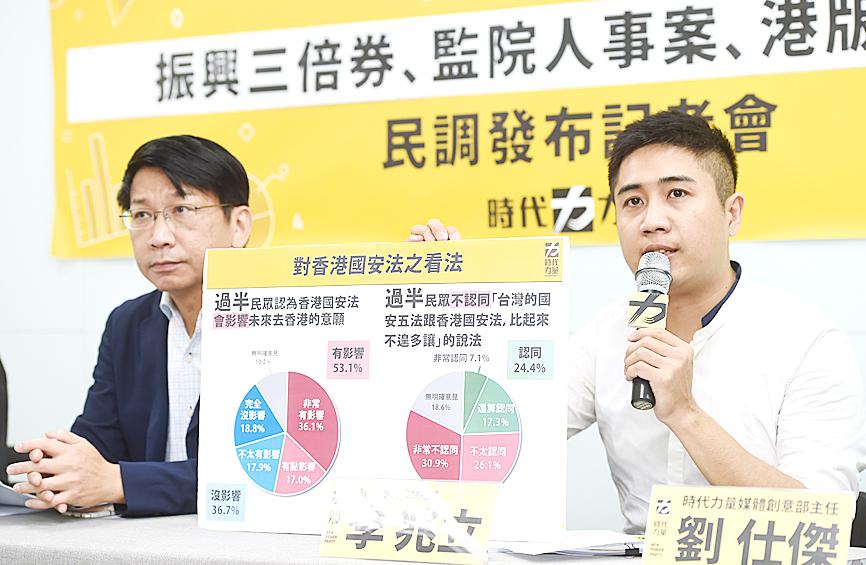More than half of the respondents in a poll said the new national security legislation in Hong Kong affected their willingness to visit the territory, the New Power Party (NPP) said yesterday.
NPP think tank executive director Lee Chao-li (李兆立) said that a survey it commissioned showed that 53.1 percent of respondents said their willingness to visit Hong Kong had been affected by the legislation, while 36.7 percent said they were not affected by it.
The poll showed that respondents with a higher education level were more conscious of how the legislation might affect them and were less willing to visit Hong Kong, NPP creative media director Jerry Liu (劉仕傑) said.

Photo: Fang Pin-chao, Taipei Times
The poll showed that 66.5 percent of people with a bachelor’s degree or higher said the legislation affected their willingness to visit Hong Kong, while 48.1 percent of people with only a junior-high school education and 32.5 percent with only an elementary-school education said they were affected by it.
Although the Mainland Affairs Council has cautioned “high-risk groups” — including people who support independence for Taiwan, Hong Kong, Tibet and Xinjiang and those who have criticized the Chinese or Hong Kong governments — not to travel to the territory, it should do more to warn all Taiwanese about the possible risks in visiting Hong Kong., Liu said.
As the US and China are engaged in a diplomatic dispute, with China ordering the US to close its consulate in Chengdu after the US ordered China to close its consulate in Houston, Taiwan should be prepared if the Chinese government orders Taiwan to close its consulate in Hong Kong, and should protect its documents and expatriates, he said.
Although some academics have warned that after implementing the national security legislation in Hong Kong, China’s next goal might be Taiwan, Lee said the poll showed that 51 percent of respondents said they were confident in Taiwan’s preparedness to confront threats from China, while 40.4 percent said they were not.
The poll showed that 54.6 percent of respondents favored maintaining the “status quo” with China, while 33.4 percent were in favor of independence and 6.4 percent supported unification.
Nearly 30 percent of respondents said they preferred “permanently maintaining the status quo,” which could also be considered being in favor of remaining independent, NPP Chairman Hsu Yung-ming (徐永明) said.
Meanwhile, the poll showed that President Tsai Ing-wen (蔡英文) and Premier Su Tseng-chang (蘇貞昌) have approval ratings of 60.8 and 56.1 percent respectively, which remains about the same as the previous survey.
However, their disapproval ratings have both increased — by 5 percentage points to 30.1 percent for Tsai and 4.1 percentage points to 35.7 percent for Su, Hsu said.
The poll also showed that 70.4 percent of people surveyed said they considered the procedure for purchasing the government-issued Triple Stimulus Vouchers convenient.
Most people said they would spend the vouchers at department stores and hypermarkets (57.7 percent) or convenience stores and supermarkets (33.1 percent), rather than at restaurants or night markets, as the government had promoted, Hsu said, adding that the actual effects of the vouchers should be observed.
The poll was conducted on July 18, and Monday and Tuesday last week, collecting 1,095 valid samples with a margin of error of 3 percentage points.

CAUTION: Based on intelligence from the nation’s security agencies, MOFA has cautioned Taiwanese travelers about heightened safety risks in China-friendly countries The Ministry of Foreign Affairs (MOFA) yesterday urged Taiwanese to be aware of their safety when traveling abroad, especially in countries that are friendly to China. China in June last year issued 22 guidelines that allow its courts to try in absentia and sentence to death so-called “diehard” Taiwanese independence activists, even though Chinese courts have no jurisdiction in Taiwan. Late last month, a senior Chinese official gave closed-door instructions to state security units to implement the guidelines in countries friendly to China, a government memo and a senior Taiwan security official said, based on information gathered by Taiwan’s intelligence agency. The

Taiwan Semiconductor Manufacturing Co (TSMC), the world’s largest contract chipmaker, said yesterday that it is looking to hire 8,000 people this year, at a time when the tech giant is expanding production capacity to maintain its lead over competitors. To attract talent, TSMC would launch a large-scale recruitment campaign on campuses across Taiwan, where a newly recruited engineer with a master’s degree could expect to receive an average salary of NT$2.2 million (US$60,912), which is much higher than the 2023 national average of NT$709,000 for those in the same category, according to government statistics. TSMC, which accounted for more than 60 percent

The National Immigration Agency (NIA) said yesterday that it will revoke the dependent-based residence permit of a Chinese social media influencer who reportedly “openly advocated for [China’s] unification through military force” with Taiwan. The Chinese national, identified by her surname Liu (劉), will have her residence permit revoked in accordance with Article 14 of the “Measures for the permission of family- based residence, long-term residence and settlement of people from the Mainland Area in the Taiwan Area,” the NIA said in a news release. The agency explained it received reports that Liu made “unifying Taiwan through military force” statements on her online

Tung Tzu-hsien (童子賢), a Taiwanese businessman and deputy convener of the nation’s National Climate Change Committee, said yesterday that “electrical power is national power” and nuclear energy is “very important to Taiwan.” Tung made the remarks, suggesting that his views do not align with the country’s current official policy of phasing out nuclear energy, at a forum organized by the Taiwan People’s Party titled “Challenges and Prospects of Taiwan’s AI Industry and Energy Policy.” “Taiwan is currently pursuing industries with high added- value and is developing vigorously, and this all requires electricity,” said the chairman